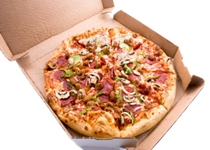 In the U.S., every year there are about three billion pizzas sold. I have to admit that many of those were probably delivered to my household.
In the U.S., every year there are about three billion pizzas sold. I have to admit that many of those were probably delivered to my household.
Pizza has been my addiction and favorite food for years. I can picture it now: spicy pepperoni, gooey mozzarella cheese, and tomato sauce on a thick pizza crust. Is there anything that tastes better?
The main ingredients in pizza are considered staples in a standard American diet—wheat or gluten and cow’s dairy, which contains the protein casein.
Many people cannot enjoy a slice of pizza or other foods containing gluten or casein, which can lead to digestive, autoimmune, and neurological issues. But it turns out that these foods could be even worse for you—they could be altering your gene expression.
Study Says: Casein and Gluten Harm Your Body
There was a study published earlier this year in the Journal of Nutritional Biochemistry. It suggested that the opioid peptides in casein and gluten interfered with antioxidant status, increased inflammation and systemic oxidative stress, and changed gene (DNA) expression, all of which can lead to degenerative diseases or imbalances in the body.
After you enjoy your pizza, the digestion of wheat and dairy releases gluten and casein peptides, which reduce the uptake of the amino acid cysteine. The antioxidant glutathione is often lower in people with neurological disorders, such as autism, and glutathione cannot synthesize without cysteine. (Environmental exposure to heavy metals is also known to deplete glutathione levels.) A diet high in casein and gluten therefore adds to the toxic environment in your body.
The study also found that a protein in gluten, gliadin, and casein, down-regulate cysteine uptake by releasing proline-rich, opioid active peptides. This occurs in gastrointestinal and neuronal cells in the human body. S-adenosylmethionine levels are also known to be low during the digestion of gluten and casein, which can cause methylation interference and lead to several diseases, including cancer.
The role food plays in gene expression is interesting. Not only can food act as a medicine or poison, but it can also provide information to genes at a molecular level. When we consume foods such as dairy, wheat, and genetically modified products, the information in our genes may change as well.
What Should You Eat?
The elimination of wheat and dairy can be a difficult task because they are foods we depend on when following the standard American diet—staples include cereal with milk, sandwiches with cheese, macaroni and cheese, and, of course, pizza.
But as the study suggests, you could benefit from a diet free of casein and gluten. So what should you eat instead?
A positive transition from gluten foods includes gluten-free grains such as quinoa, wild rice, brown rice, amaranth, or millet. I recommend the whole food approach to eating, which is similar to the paleo diet or anti-fungal/anti-candida diet.
If taking this approach, here are some foods you can incorporate into your daily diet:
- Plenty of green leafy vegetables: kale, parsley, spinach, arugula, and dandelion
- Other nutrient-dense veggies: carrots, celery, cauliflower, and broccoli
- Some fruits: apples, blueberries, and lots of avocado
- Nuts, seeds, and nut and seed butters: almonds, pumpkin seeds, and Brazil nuts
- Organic and grass-fed animal products: eggs, beef, chicken, and wild fish
- Legumes: black beans, adzuki beans, and chickpeas
- Herbal teas
You may be surprised how your health improves after you cut out your gluten and casein addictions. Could you give up your pizza night for a lifetime of better health?
Also Read: An Ancient Eating Secret for Great Health
Sources for Today’s Article:
Ji., S., “Eating Wheat & Cow’s Milk Disrupt DNA Expression & Antioxidant Status,” GreenMedInfo web site, October 27, 2014; http://www.greenmedinfo.com/blog/eating-wheat-cows-milk-disrupt-dna-expression-antioxidant-status.
Millward, C., et al., “Gluten- and casein-free diets for autistic spectrum disorder,” The Cochrane Database of Systematic Reviews 2004; (2): CD003498.
Trivedi, M.S., et al., “Food-derived opioid peptides inhibit cysteine uptake with redox epigenetics consequences,” Journal of Nutritional Biochemistry October 2014; 25(10): 1011–1018, doi: 10.1016/j.jnutbio.2014.05.004.
